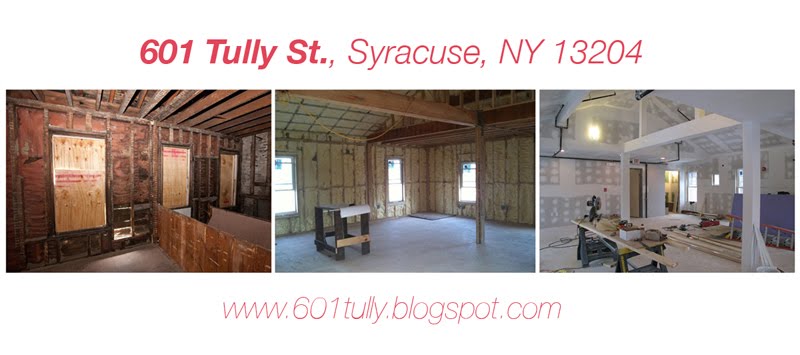About 601 Tully
Check out our new website! 601Tully.syr.edu
601 Tully is a center for engaged practice in Syracuse, NY developed by artist and professor Marion Wilson with a rotating collaborative team of 54 students and neighbors and Anda French of French 2Design. It's a site for meaningful exchange between artists, community members, and scholars in the co-production of culture.
601 Tully includes a contemporary art space, a public events space, a bookstore, a teaching garden, and Recess Cafe West.
In 2009, Wilson purchased the condemned two-story home and local drug hub, and throughout five semesters, Wilson's design/build class re-zoned, designed, renovated and now sustains the physical and programmatic aspects of 601 Tully. The collaborative team has consisted of artists, architects, environmentalists, Fowler High School students, Green Train Workforce, neighbors, and the occasional passerby.
601 Tully is made possible by the generous support of the Syracuse University School of Education, The Kauffman Foundation, The Near West Side Initiative, Imagining America, Home HeadQuarters Inc., Say Yes to Education, and National Grid.
Find us on Facebook!
Friday, February 19, 2010
here is a combined industrial design/architecture/landscape architecture class hosting a listening session to hear about food systems issues as they relate to stakeholders from 7 sectors of the food system this Friday 12-2 pm in the auditorium of the SU Warehouse, downtown. I spoke with Matt Potteiger, ESF Landscape Architecture professor and he said your group is more than welcome to attend.
Participants include:A representative from Grinestone Farm, a local organic farm 35 minutes north of Syracuse
A representative of Syracuse Grows
A representative from the Near Westside Initiative talking about plans for an urban greenhouse and farm
A rep from a local soup kitchen
A rep from the CNY Regional Farmers’ Market
A rep from Madison County’s Bounty Program and the Coordinator of Agricultural Economic Development
A rep from the board of the Mobile Market and a Director of Senior Nutrition Services for Onondaga County
Participants have been asked to address the following questions:
- What is the mission of your organization?
- Do you rely specifically on particular funding sources for your work, and if so, what are your funding cycles and do these impact your work?
- What are your long-term goals within your organization's mission?
- Given the realities of everyday life, what do you find that you actually do most of the time if different than these goals?
- What it is that you wish you could do; what might be your vision statement?
- What gaps do you see in the regional food system from your organization's point of view?

I saw this too late but it looks fascinating. Were you able to attend?
ReplyDeleteIf so what was it like?
It's my studio...it was very generic in terms of information / concrete needs/desires of the organization. However, the general theme was of the desire to link + educate people about food systems' impact on their lives; interesting to us is some of the educational desires and also the need for a collaborative space for these multiple agencies to talk and work together.
ReplyDelete